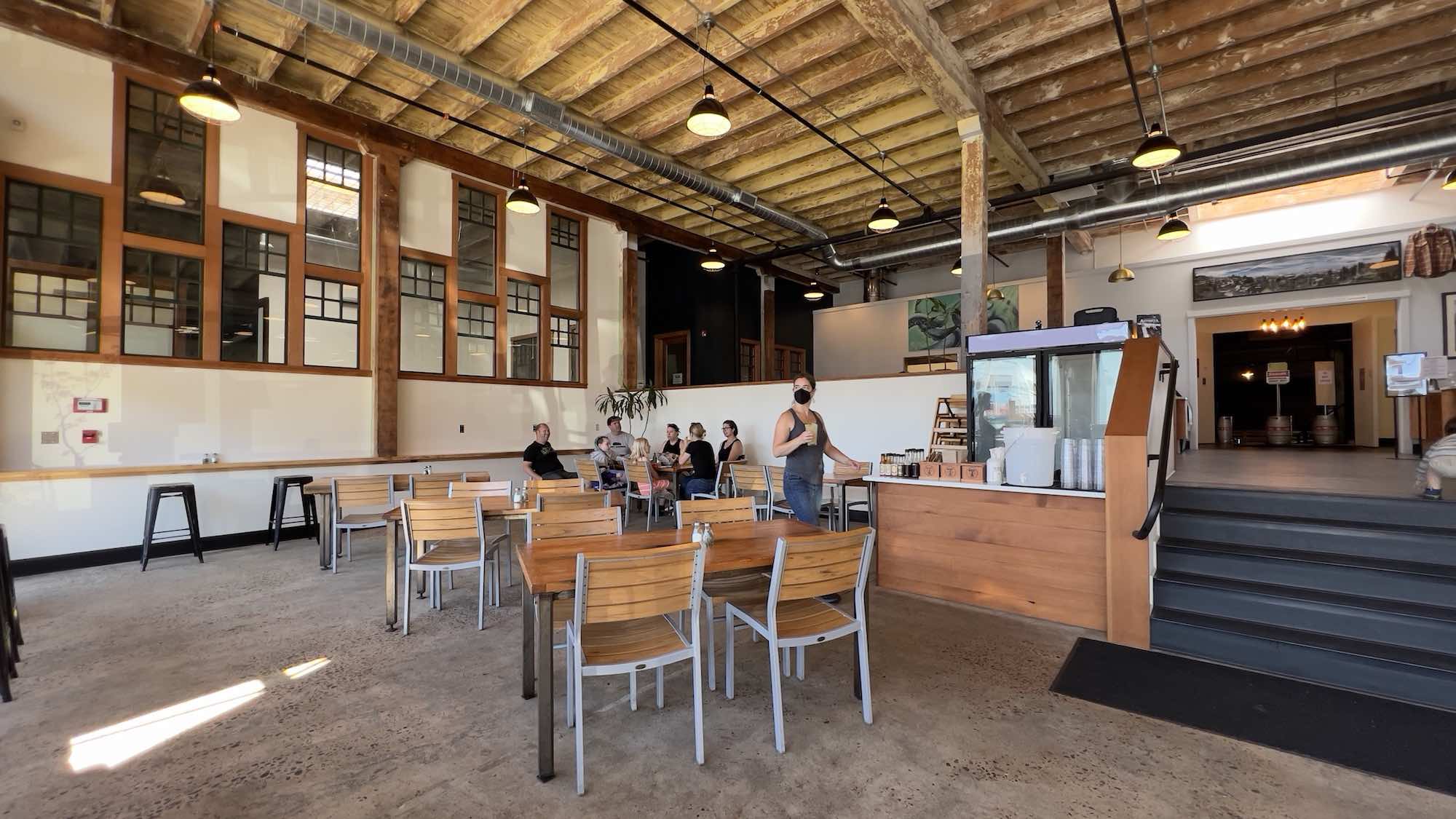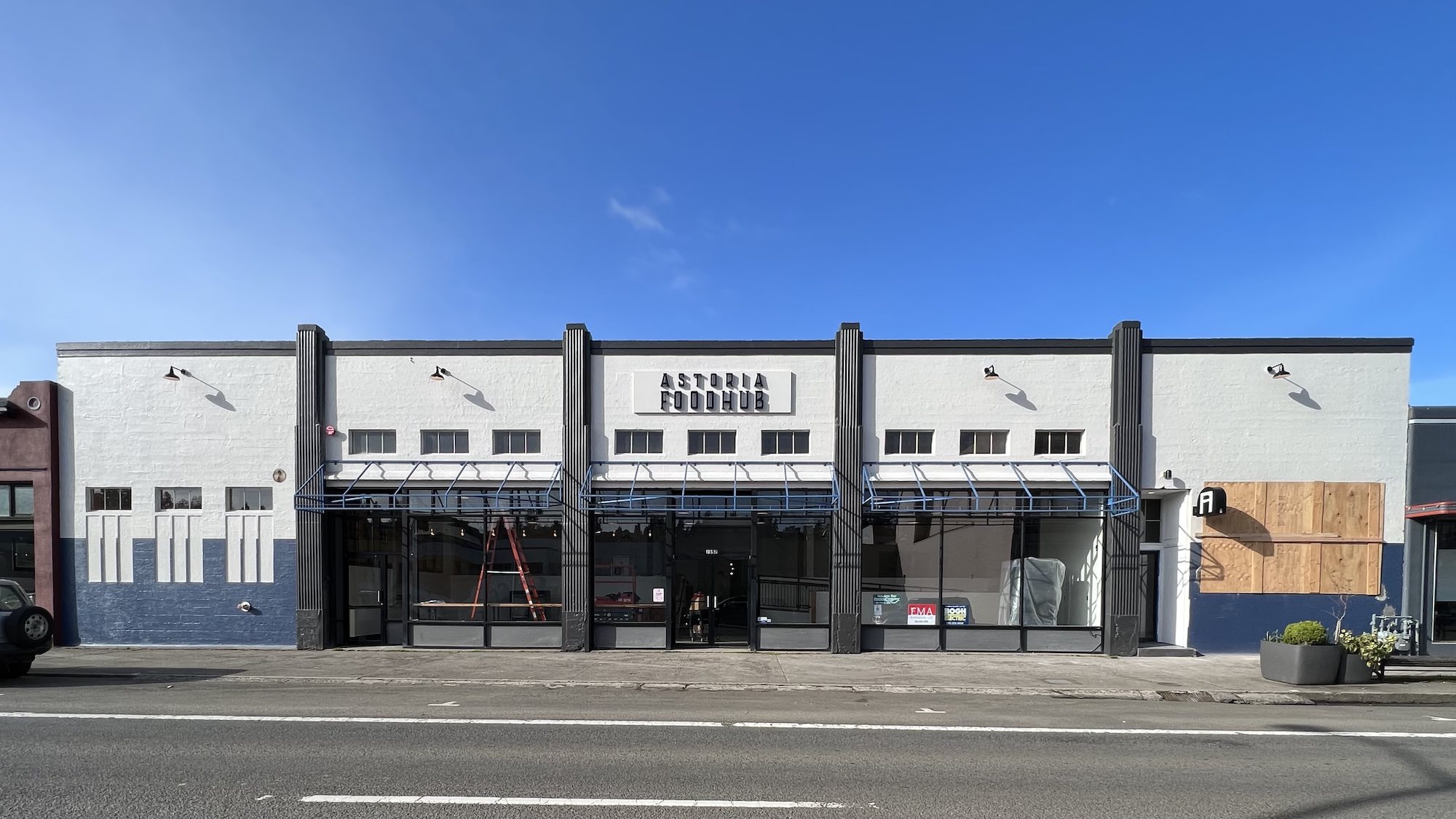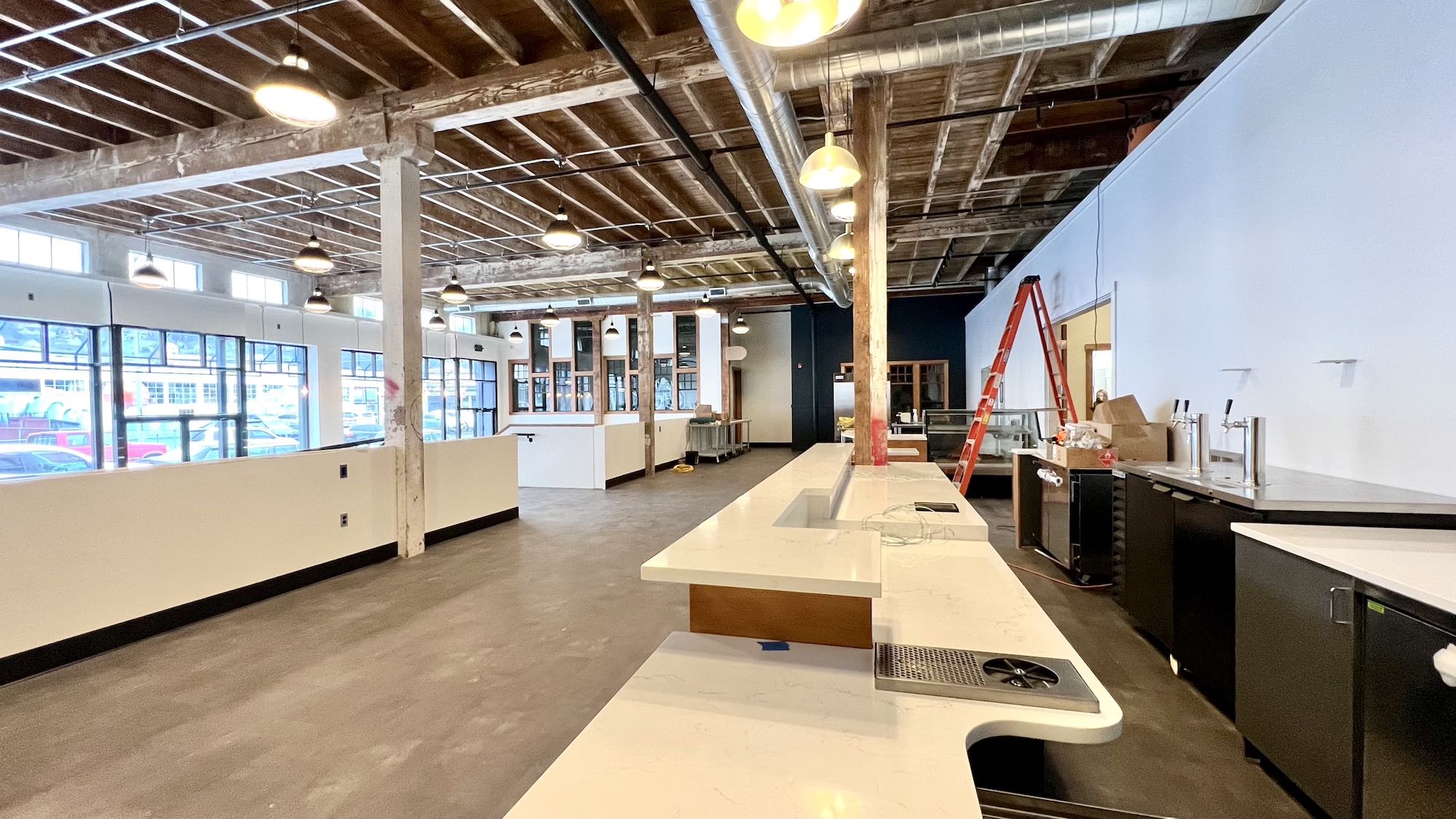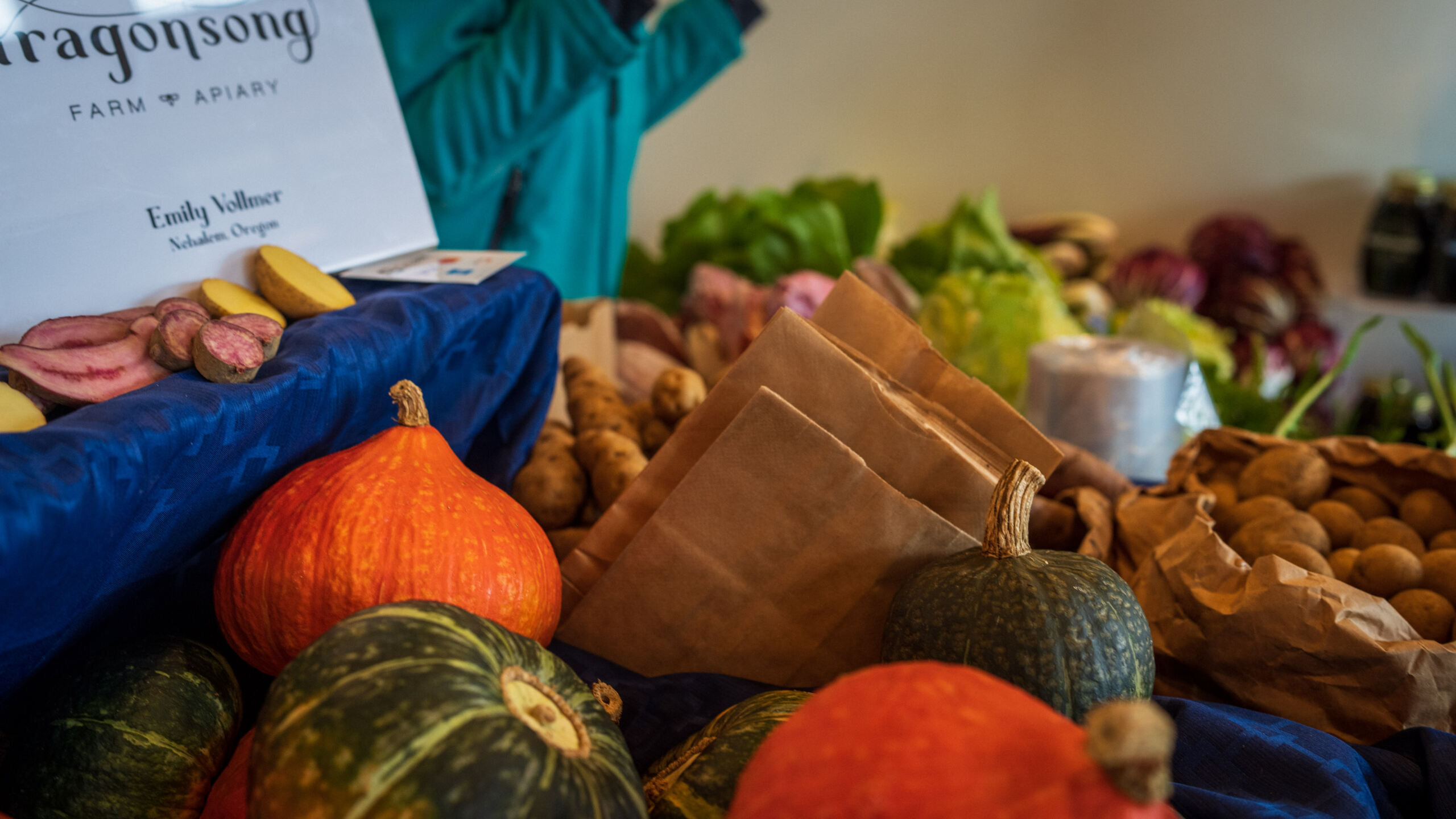ASTORIA, Ore. — The historic Mason, Ehrman & Co. building is perched along the Columbia River waterfront in downtown Astoria, Ore., flanked by shops and restaurants where tourists can watch passing cargo ships on their trans-Pacific journey.
Inside the mostly empty warehouse, Fred Johnson, an organic farmer from across the river in Naselle, Wash., chatted with the new owners of the building on a recent May afternoon about their plans to create a local food hub for the region’s many small farmers, ranchers and fishers.
The Astoria Food Hub is an ambitious, multi-phase project that would promote the rich agricultural bounty of Oregon’s North Coast. Plans include a cold storage, a commercial kitchen, retail stores, a distribution center and restaurant.
Johnson, a former restaurant owner and chef, was recently brought on as a consultant to the food hub, poring over blueprints and sharing ideas for the design. His experience gives him a unique perspective of both the needs of farmers, and intricacies of the food system.
“People want that kind of freshness, that kind of delivery,” Johnson said. “It’s just a question of how do producers come up with the infrastructure they need.”
Phase I of the food hub is expected to be completed by September or October, said Jared Gardner, owner of the Nehalem River Ranch and a central partner in the project.
His team completed the purchase of the building in April, and is now recruiting tenants who share their vision for community-supported local agriculture.
Lack of infrastructure
Gardner and his wife, Hilary Foote, started ranching in Nehalem, 40 miles south of Astoria, in 2014. They raise grass-fed beef and pastured pork.
As small-scale ranchers, Gardner said they face challenges getting their meat to market. Nehalem River Ranch processes about 35 cows and 90 hogs per year. The closest cold storage space they can rent is 80 miles away in Portland — a three-hour drive round-trip.
The food hub aims to address that lack of infrastructure, providing the facilities necessary to get locally produced food from farm to plate.
“We’re trying to solve those market gaps,” Gardner said.
According to a USDA directory, there are 219 local food hubs across the country, including five in Oregon. As demand for fresh, local food increases, the role of food hubs is to help aggregate and distribute products from small-scale farms, allowing them to access markets they otherwise couldn’t reach on their own — such as restaurants and grocery stores.
Before Johnson turned to organic farming, he ran a restaurant for nearly four years in Vashon Island, Wash., called Fred’s Homegrown Cafe. His goal was to cook as much as possible with local ingredients, though he said it was difficult to find farmers who could keep pace.
Restaurants need suppliers who can reliably deliver products each week, Johnson said. That’s where traditional wholesale food distributors such as Sysco typically come in.
“I had some success getting local products on the plate, but for the most part I was just as tethered to standard purveyors as anyone,” he said.
But Johnson said he always preferred farm fresh produce. “Sysco cannot deliver a tomato like I can grow and pick right off the vine,” he explained.
Customers at Fred’s Homegrown Cafe particularly craved local eggs, and pancakes made with fresh Marionberries.
“The public is just hungry for this,” Johnson said. “And so, if you can offer it, they just gobble it up.”
Nehalem Provisions
Gardner believes Oregon’s North Coast is one of the best food regions in the world.
Farmers grow a variety of cool-season crops, from leafy greens to berries. The climate is ideal for lush green pastures where cattle graze, producing meat and milk. Then, of course, there’s the seafood, delivered fresh off the fishing boats.
“You got your meats, your cheeses, your fish, your salads … what else is there, right?” Gardner said.
Small farms dominate the agricultural scene on the North Coast. As of the latest USDA Census of Agriculture, Clatsop and Tillamook counties had a combined 519 farms, of which 212 farms — roughly 40% — sell less than $2,500 worth of products each year.
The idea for the Astoria Food Hub started percolating several years ago as Gardner was working to supply local beef to the Fort George Brewpub, a popular spot in the city.
Looking at the numbers, the demand was more than anybody he knew could produce by themselves, Gardner said. Rather than forming a co-op, Gardner established Nehalem Provisions in 2018, buying beef and pork from other ranchers along the North Coast to sell to Fort George.
A local food hub could provide a similar boost for farms of all types, Gardner realized.
“It really was seeing the demand from the local marketplace, the chefs that want good products and their customers, that kind of got us thinking about a physical space to have a larger cold storage, the distribution hub and more retail space,” Gardner said. “That’s where this idea was born.”
Historic building
Gardner and his team of partners have spent the better part of the last two years searching for a home for the food hub.
In December, they found the Mason, Ehrman & Co. building. The spacious Art Deco facility began life in the 1930s as a wholesale grocer that shipped goods along the Pacific Coast from Northern California to Alaska.
Most recently, the building was used as a Sears Hometown store before it closed last year. A few remnants of Sears shelving and inventory lie scattered on the wooden floor of the back loading dock, facing the waterfront.
The Astoria Food Hub raised $700,000 to buy the building, returning it to its food-based roots. The sale closed on April 26.
Funding for the purchase came through Steward, an online lender specializing in agricultural projects that allows members of the community to invest in the loan and earn interest.
“We were blown away by all the support from the community for investing in this,” Gardner said.
Corey Omey, the architect behind the food hub and one of its co-owners, said the plan is to promote the building’s history, coming full circle as a local and regional food distributor.
“I think it’s a perfect historical backdrop,” said Omey, who owns EMA Architecture in Portland. “It’s really fun to bring that character and quality back into a space.”
Omey was introduced to Gardner last spring, and the two became fast friends upon realizing they had a shared vision for local food. Growing up in Western Michigan, Omey was raised in a food co-op, and said local food is part of his DNA.
“We have the same ethos,” Omey said. “When you meet someone who is so passionate about food systems, health and equity within farming, fishing and ranching … that’s exciting. It’s fun to be part of things like that.”
As currently envisioned, the 13,500-square-foot building will have two to four office and retail spaces in the front of the building, facing Marine Drive. The back warehouse area will be reserved for a cold storage, kitchen space and later a restaurant serving local food.
The building also has a 13,500-square-foot basement that will be retrofitted in future phases of the project for additional storage and processing space.
Benjamin Ariff, owner of Straw to Gold Productions in Portland, is another partner on the project, helping to envision its interior design. He said their approach is to create a hub that’s genuinely built for everyone.
“I think it is important for us as consumers to be more in touch with the food system and pay more respect to those people,” Ariff said. “We’re going to make some steps in the right direction toward that.”
Attracting tenants
While design and construction work gets underway, Gardner said the next step is to find tenants who in turn will become the heart and soul of the food hub.
At least one tenant is already interested in joining the project. The North Coast Food Web, an Astoria-based nonprofit, works with approximately 40 local producers in Clatsop and Tillamook counties, providing educational programs and running a weekly farmers market.
Jessika Tantisook, the group’s executive director and a former cranberry farmer, said the market was forced to pivot to online sales this year amid the coronavirus pandemic. She started working with Gardner at Nehalem Provisions to pick up and deliver produce that was sold online, since he was already on the road.
At the food hub, Tantisook said they would have more space for their retail store to sell local food products, and a demonstration kitchen where they can teach community members about healthful eating and sustainability.
The group’s board of directors is now considering a letter of intent to join the food hub.
“I hope that, in 5 to 10 years, we see the North Coast as a great place to be a producer,” Tantisook said. “Clatsop County has a rich history of agriculture, fishing and ranching. But I think that in the last few decades, a lot of that has gone away because there isn’t the support services for it. I hope that the food hub can be that entry point.”
Johnson, the Washington farmer, said the food hub is “absolutely” something he would be interested in joining.
“There are a lot of logistical issues going on (with small farmers),” he said. “That’s what I find fascinating with this place, because they’re actually focusing on those issues.”
If all goes according to plan and the project continues to attract investment, Gardner said the restaurant could be in operation by next spring, and the basement completed by next summer. More than 100 people have already registered their intent to invest in the next phase of the project on Steward.
“To me, it’s clear that people want healthy, good-tasting local food, and they’re willing to invest in it with their pocketbooks,” Gardner said.




